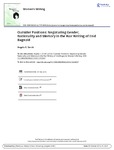Outsider Positions: Negotiating Gender, Nationality and Memory in the War Writing of Enid Bagnold
| dc.contributor.author | Smith, Angela | |
| dc.date.accessioned | 2016-10-19T14:36:27Z | |
| dc.date.issued | 2016-09-30 | |
| dc.identifier.issn | 0969-9082 | |
| dc.identifier.issn | 1747-5848 | |
| dc.identifier.uri | http://hdl.handle.net/10026.1/6575 | |
| dc.description.abstract |
In 1918 Enid Bagnold published A Diary Without Dates, a revealing book that kept few secrets about life in the wartime hospital. Bagnold’s book has helped the construction of the mythology of disillusionment that has clouded memory of the war for a century. In 1920, Bagnold published The Happy Foreigner, a novel that is much less easy to categorize. As her protagonist, Fanny, drives across the derelict battlefields of France, she reflects on the ways in which those battlefields may be recalled in later cultural memory. However, there is a curious optimism in Fanny that is quite at odds with these later constructions of disillusionment. France in 1919 is a melting pot of different people, military and civilian, men and women, representing many different nations as the first understandings of memory crystallize. This essay explores Enid Bagnold’s two war books in terms of the ways in which she negotiates gender and nationality. What does it mean to be a woman in a hospital? How do different nationalities interact in the post-war landscape, questioning these myths of disillusionment before they are even constructed? By considering these outsider positions, I shall argue that Bagnold’s role in helping to shape our memory of the war is far more complex than it might first appear. | |
| dc.format.extent | 8-22 | |
| dc.language | en | |
| dc.language.iso | en | |
| dc.publisher | Taylor & Francis | |
| dc.subject | Gender | |
| dc.subject | War writing | |
| dc.subject | Nationality | |
| dc.subject | Memory | |
| dc.title | Outsider Positions: Negotiating Gender, Nationality and Memory in the War Writing of Enid Bagnold | |
| dc.type | journal-article | |
| dc.type | Journal Article | |
| plymouth.issue | 1 | |
| plymouth.volume | 24 | |
| plymouth.publication-status | Published | |
| plymouth.journal | Women's Writing | |
| dc.identifier.doi | 10.1080/09699082.2016.1232507 | |
| plymouth.organisational-group | /Plymouth | |
| plymouth.organisational-group | /Plymouth/Faculty of Arts, Humanities and Business | |
| plymouth.organisational-group | /Plymouth/REF 2021 Researchers by UoA | |
| plymouth.organisational-group | /Plymouth/REF 2021 Researchers by UoA/UoA27 English Language and Literature | |
| plymouth.organisational-group | /Plymouth/Users by role | |
| plymouth.organisational-group | /Plymouth/Users by role/Academics | |
| dcterms.dateAccepted | 2015-09-01 | |
| dc.rights.embargodate | 2018-4-1 | |
| dc.identifier.eissn | 1747-5848 | |
| dc.rights.embargoperiod | 18 months | |
| rioxxterms.versionofrecord | 10.1080/09699082.2016.1232507 | |
| rioxxterms.licenseref.uri | http://www.rioxx.net/licenses/under-embargo-all-rights-reserved | |
| rioxxterms.licenseref.startdate | 2016-09-30 | |
| rioxxterms.type | Journal Article/Review |


